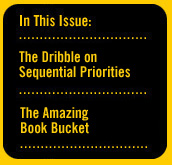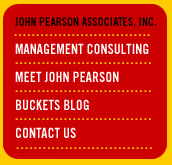

Issue No. 25 of Your Weekly Staff Meeting affirms there is wisdom in books—even “old ones” from the 1980s. And thanks for your affirmations on this weekly labor of love. I write it (the love part), my son, Jason, designs it (the labor part). For a father of four (including triplet four-year-olds), he leads an amazingly balanced life and he loves his work at his two companies, Pearpod and Free Church Printing.
Setting priorities is not an exact science in the workplace. It’s even more difficult for the thoughtful Christian leader or manager—in spite of the trite conventional wisdom. Most books, and far too many preachers, will give you this dribble about balancing priorities: God is first, family is second, church is third, and your career is fourth.
J. Grant Howard writes that a list of sequential priorities makes absolutely no sense. “It can’t be intelligently explained. It can’t be easily understood. It can’t be logically lived out.” He adds, “I am convinced that the existing sequential model is not only impractical it is unbiblical.”
Instead, Howard believes that Matthew 22:34-40 says we have two relationships and responsibilities—equal in importance—God and our neighbor. With God at the center circle of his helpful diagram, a second circle of self surrounds God and then a third circle with five segments—work, world, government, church and family—make up the outer concentric circle. Balancing Life’s Demands: A New Perspective on Priorities gives comfort: life will often be out of balance. It’s OK. Howard wrote this classic in 1983 and his message is still revolutionary and still needed.
Your Weekly Staff Meeting Questions:
---------------------------------------------------------------------------------------------------
1. According to Howard, Christ says “Put God first” and “Put your neighbor first” also. Make them both your top priority. How do you feel about this?
2. When life is out of balance, what are some practical ways to get it back into a God-honoring balance?
---------------------------------------------------------------------------------------------------
Insights from the Management Buckets Workshop Experience
“By working faithfully eight hours a day, you may eventually get to be a boss and work 12 hours a day,” wrote Robert Frost. But really, it doesn’t have to be that way. When your team is thriving at work, you too can leave on time and thrive at home. Many bosses teach, mentor, equip, encourage and motivate their team members with the simplest tools—books!
Build a management library in your office. Avoid the “Management by Bestseller Syndrome” that requires everyone to read this month’s trendy book. Instead, recommend specific titles to specific people for specific problems or opportunities. How do you teach the priority of affirmation to a rookie manager? Help her understand “One Minute Praisings” from Ken Blanchard’s classic, The One Minute Manager.
In our Management Buckets Workshop Experience, you’ll receive my list of The Top 100 Books of All Time when we explore the amazing tools in The Book Bucket. That’s just one of the 20 Critical Competencies Required for Leading and Managing Today’s Nonprofit Organization.
Email me to reserve space in the May 9-10 Management Buckets workshop or the May 11 Nonprofit Board Governance workshop, both planned for Orange County, California.

Your Weekly Staff Meeting Questions:
---------------------------------------------------------------------------------------------------
1. Next week, bring the most helpful management book you’ve ever read—and give us a two-minute review.
2. Let’s list some Book Reading 101 principles for getting the most out of a book. Give us your best ideas.
---------------------------------------------------------------------------------------------------
Download the Management Buckets brochure
PS. Click “Forward Email” below to recommend this free eNews to a colleague.






